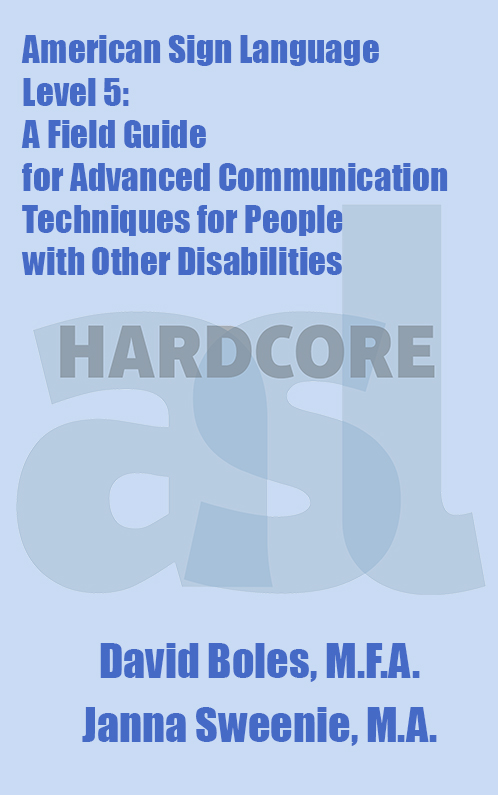Three days ago, after publishing our latest Boles Book — American Sign Language Level 5: A Field Guide for Advanced Communication Techniques for People with Other Disabilities — I unwittingly ran afoul of Facebook’s advertising rules. I had “too much text” in my book cover image and so Facebook censored my $40.00USD boosted post promotion of my book midstream, effectively blocking my book cover image on their social network because my design aesthetic didn’t meet their advertising rules.

This is how Facebook notified me via email of the advertising stoppage — and being accused of “violating” them is just the wrong word to use in any context because it implies contemptuous deceit and malice of intention — and none of that applied, at the time, to me or the book cover:
Here’s the nefarious, violating, book cover in question, and yet it really is the book of a lifetime with over 60 years of teaching experience expressed in the Field Guide:

Should Facebook be in the business of punishing publishers?
Should Facebook be in the book design cover business at all?
Scholarly books tend to have long titles — and that means a lot of “text” — plus, you often have more than one author on such a book and that, too, means more “text” and it appears none of that matters to Facebook if you want to spend money on their network.
Our “Hardcore ASL” logo is also explicitly, and contextually textual, by design — and Facebook clearly didn’t like that, either.
When I asked for clarification about the censoring of my ad, Facebook took three days to send me this boilerplate reply:
Thanks for writing in. I’m here to help.
Your ad was rejected because it violates our text in image policy. Ads and Sponsored Stories that appear in News Feed may not include images with more than 20% text in them.
Logos, unfortunately, are not an exception to this policy. We suggest you make the logo your Page’s profile picture, so that it appears along with the post.
Please note that your ad is first approved to help it not lose its delivery potential. One ad can be subjected to multiple levels of review in its course. One of them – being when your ad receives a News Feed impression. Especially Text Policy is valid only for images that appear in News feed. I apologize for the inconvenience or confusion this might have created.
You’ll need to recreate and submit your ad with a new image that has less than 20% in it. To edit your image, you could use a smaller font to fit the image text in less space.
At the end of the Facebook robot reply were lots of URLs I could click on to “test” my redesigned book cover and such — but I skipped all of that because I wasn’t going to redesign anything — and went right to the opportunity to give more specific feedback on the Facebook advertising text policy:

Here’s the text message I included at the end:
Facebook should not be in the business of redesigning book covers for publishers. You don’t want our advertising money? That’s fine, but why enforce a 20% Text advertising policy that is untenable for select businesses that require text titles and author names in text to be sold to the public? You need to have an exception rule in place for advertising books on Facebook because right now, your policy unfairly punishes the regular business of book publishing. I am also not a fan of cut-and-paste boilerplate responses. Please be human in your interaction. Type original replies to inquiries that create intimacy in communication.
Lesson learned.
Facebook is free to enforce any policy they like, and I am just as free to never give them another dollar for advertising on their service.
That’s too bad because I get some good coverage on Facebook and I have a large, curated, integrated network that I find quite lovely — and the whole experience took me years of daily effort to grow, but if Facebook doesn’t want me, or my money, or my book design aesthetic — then I don’t want them, either.
I find that strange. It doesn’t seem like people are making these decisions at Facebook, just computers.
I find it to be an odd policy that punishes book publishers because you can’t advertise unless your book cover meets their design aesthetic.
I was hoping that a human review would reverse the decision, but that didn’t happen. More of the same boring boilerplate.
I like what you said at the end. They do what they want and you won’t give them any more money. As you say, “Vote with your wallet.”
Yes, I don’t think they care — they send me messages about wanting my money and my advertising — but, I guess that only memes on their terms and not what I want or need or how I want to advertise. Silly policies make silly social networks.
Here’s my Twitter update with the full “violation” notice in context with the cover. It would make me laugh if I weren’t still crying:
https://twitter.com/DavidBoles/status/495194239978831873
Oh, it could only get worse and more ridiculous, eh?
http://allfacebook.com/grid-tool-ads-manager-20-percent-text-rule_b134244
When you need a "violation tool" to determine if your Ad has too much text — those wanting your money need to stop trying so much human patience against robot overlords.